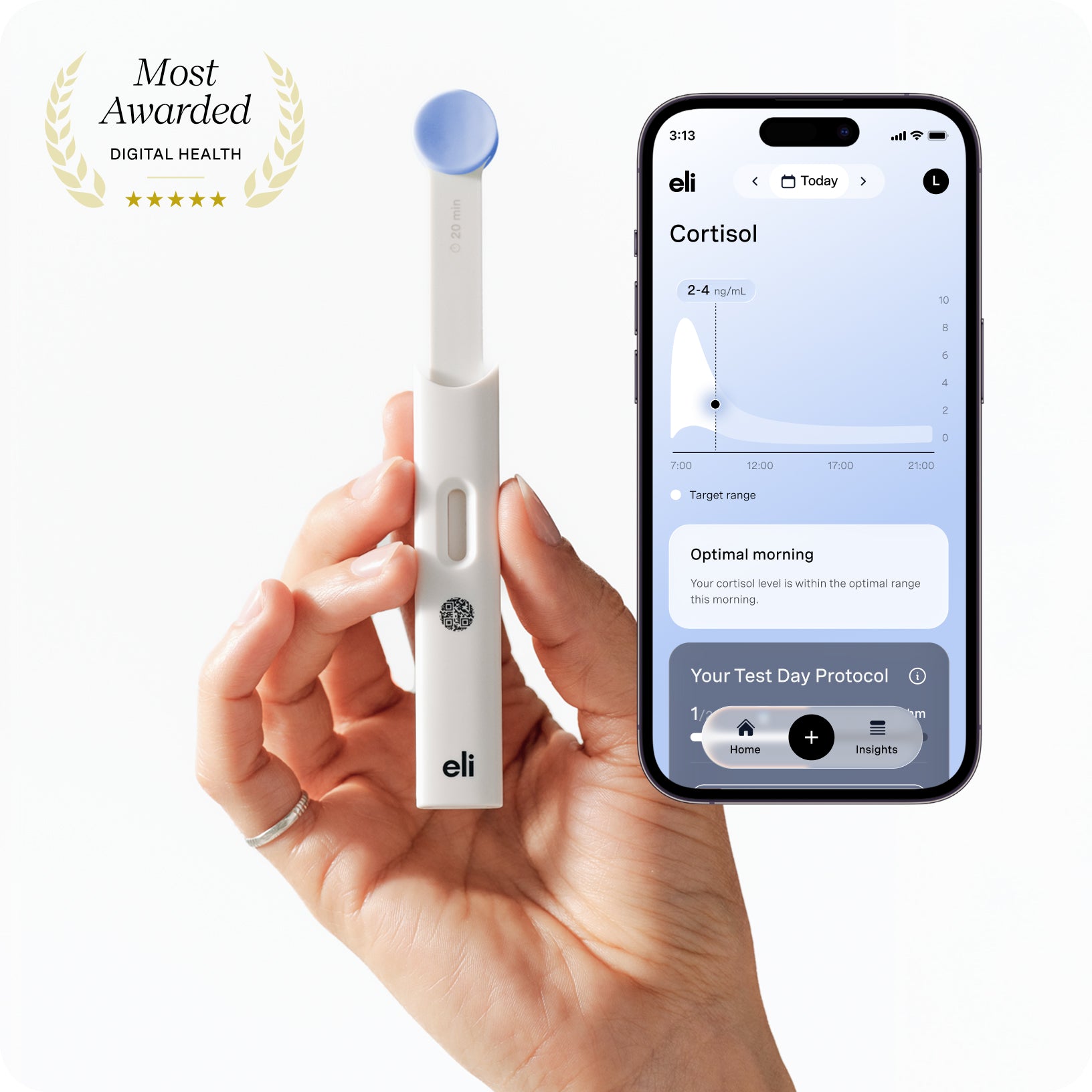Key takeaways:
-
Cortisol is your body’s primary stress hormone, critical for regulating sleep, metabolism, and energy.
-
Chronic stress and disrupted cortisol rhythms can drain energy and impact overall health.
-
Sleep, nutrition, physical activity, and stress-management practices all influence cortisol.
While cortisol, your body’s primary stress hormone, plays a crucial role in energizing you for the day ahead, chronic stress and elevated cortisol levels can leave you feeling the exact opposite.
The good news: cortisol is something you can influence.
How cortisol impacts energy levels.
Cortisol is produced by the adrenal glands, playing a role in the body’s sleep-wake cycle, blood sugar, and metabolism.
Under normal conditions, cortisol levels peak in the morning to help you wake up and gradually decline throughout the day. However, excess cortisol can disrupt the natural cortisol rhythm, leading to irregular energy patterns. High cortisol levels can cause:
-
Sleep disturbances leaving you fatigued during the day.
-
Blood sugar spikes and crashes, resulting in energy dips.
-
Depleted critical hormones, resulting in hormone imbalance.
"By maintaining balanced cortisol levels, you can boost your natural energy reserves and feel more vibrant throughout the day," says Dr. Fady Hannah-Shmouni, MD. To maintain stable energy levels, it’s essential to manage cortisol effectively.
Here are five tips to help you boost your energy naturally by balancing cortisol:
1. Prioritize sleep.
One of the most important factors in maintaining healthy cortisol levels is sleep. Lack of sleep or poor sleep quality increases cortisol levels, leading to fatigue and energy crashes during the day. Sleep deprivation triggers a stress response in your body, causing cortisol to remain elevated when it should be declining.
Tip:
Aim for 7-9 hours of restful sleep each night. Establish a regular sleep schedule, avoid screens before bedtime, and create a calming bedtime routine to support deep, restorative sleep. By improving sleep quality, you’ll regulate cortisol and feel more energized throughout the day.
2. Eat balanced meals to prevent energy dips.
Cortisol is closely tied to blood sugar regulation. Processed or sugary foods cause spikes and crashes, prompting cortisol to step in and restore balance.
Tip:
Build balanced meals that combine complex carbohydrates, healthy fats, and protein. Foods rich in fiber, like whole grains and vegetables, help regulate blood sugar and keep cortisol levels steady. Include cortisol-friendly foods like salmon, walnuts, and leafy greens in your diet to support sustained energy.
3. Stay physically active to boost energy.
Exercise is a great way to reduce cortisol and improve energy levels. Physical activity helps burn off excess cortisol, making you feel more alert and energized. Exercise also stimulates the production of endorphins, the body’s natural mood and energy boosters.
Tip:
Incorporate 30 minutes of moderate exercise, such as walking, cycling, or yoga, most days of the week. Exercise not only helps lower cortisol but also improves mood and cognitive function, keeping your energy levels steady throughout the day.
4. Practice stress-relief techniques to lower cortisol.
Chronic stress is one of the biggest drivers of elevated cortisol levels, and high cortisol can leave you feeling tired and mentally drained. Practicing stress-relief techniques like deep breathing, meditation, or yoga can help activate your body’s relaxation response, reducing cortisol levels and boosting energy.
Tip:
Incorporate stress-relief techniques into your daily routine, even for just 10-15 minutes a day. Activities like progressive muscle relaxation, mindfulness, or a few minutes of deep breathing can lower cortisol and help you recharge.
5. Monitor your cortisol levels for better energy management.
Until recently, cortisol could only be measured with lab tests that offered a single snapshot. But cortisol is dynamic; it fluctuates across your day in response to sleep, meals, exercise, and stress.
Keep up with what’s shaping hormone health. Subscribe.













